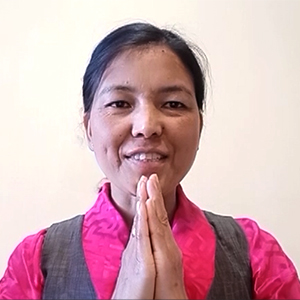TIBETAN LANGUAGE COURSES
If you attend the Summer Institute, these courses are included in your tuition. Or Tibetan language courses can be taken alone, without attending the Summer Institute. You can register here to attend a Tibetan course without participating in the Summer Institute program.
All Tibetan classes will be transmitted live via Zoom and recorded for viewing asynchronously through our Online Campus (Moodle). Tibetan language course recordings will be available until October 5, 2025.
(Chinese translation will not be available for Tibetan language courses.)

NIMA BHUTI

GERRY WIENER
Prerequisites: None
This class is oriented toward students who have no experience or little experience with colloquial Tibetan. During the Summer Institute, we will introduce the eight categories of Tibetan letters, how to spell Tibetan words aloud, how to pronounce Tibetan letters and words, and how to read and write Tibetan. We will also introduce some useful phrases and sentences.
The Eight Categories of Tibetan Letters
- Thirty Consonants
- Four Vowels
- Ten suffixes
- Five prefixes
- Two sub-suffixes
- Superscribed Letters
- Subscribed Letters
- Punctuation
On learning these eight categories of Tibetan letters, students will be able to read Tibetan texts aloud with correct pronunciation.
Required Text:
Tibetan Language for Daily Use, A Textbook for Beginners: Introducing 8 parts of the Syllables by Nima Bhuti – Books on Google Play

GERRY WIENER
Course description: This course is for students who have already learned the Tibetan alphabet and have familiarity with reading and pronouncing Tibetan words and sentences. Lessons will focus on improving pronunciation, reading, and comprehension and will involve a significant amount of drilling and pattern substitution. The main text for this course is Speak Fluent Tibetan by Dr. Chok Tenzin Monlam Peltsok. You can preview the text at books.google.com (search for Speak Fluent Tibetan). If you feel comfortable with the content in the first ten to fifteen lessons (available in the preview), you should be able to attend.
Intermediate Colloquial Tibetan
(continuation)
July 19 – August 5, 2025
See schedule here
Also taught by Nima Bhuti and Gerry Wiener, this course is for those students who already have some established grounding in colloquial Tibetan. The focus will be to gain further fluency in reading, speaking, listening, and understanding Tibetan using the Central Tibetan dialect. Classes are mostly in Tibetan with minimal English.
Required Texts:
Speak Fluent Tibetan by Dr. Chok Tenzin Monlam Peltsok (Google Books)
Speak Tibetan the Tibetan Way by Nyima Dekyi (Google Books)
Prerequisites:
Students should know:
- The equivalent of the first 45 chapters of Speak Fluent Tibetan and Speak Tibetan the Tibetan Way.
- What the essential and existential verbs are and how they are used (yin, min, red, ma red, yod, med, ‘dug, mi ‘dug, yod red, yod ma red)
- Demonstrative pronouns (‘di, de, pha-gi, ya-gi and ma-gi etc.)
- Personal pronouns (nga, khyed-rang and khong etc.)
- Volitional and non-volitional verbs
- Transitive and intransitive verbs
- Verb tenses (past, present, and future) and auxiliary verbs
- Basics of locative, genitive, and instrumental cases
- Some understanding of the difference between honorific and non-honorific words and when to use them
- How to read somewhat more complex Tibetan sentences aloud (but not necessarily understand their entire meaning)
Reading Tibetan Buddhist Literature
(intermediate)
July 19 – August 5, 2025
See schedule here
FACULTY

MARK SEIBOLD
Course description: Reading Tibetan Literature is dedicated to reading Tibetan Buddhist texts and literature from original source texts and commentaries in the Kagyü and Nyingma traditions. The choice of text for Nitartha Summer Institute 2025 will be announced before the start of the Summer Institute.
This course assumes a general familiarity with Tibetan grammar. The level of difficulty is roughly equivalent to second year Tibetan at the graduate level. Students will be asked to prepare passages to present in class for review and analysis. The foci of the course are (i) developing familiarity with Tibetan grammar, (ii) cultivating reading skills and (iii) gaining facility with using commentaries to unpack a root text. Interesting and important grammatical points will be explained in the context of specific passages.
Opening and closing chants are done in Tibetan. Students are encouraged to practice reading aloud to learn the rhythms and feel of the phrasing of the language.
Additional course description: In Session 1, we will translate a selection of chants, liturgies and legendary histories (such as the origin story of the Boudhanath stupa, known in Tibetan “Cha-rung Kashor.“ In Session 2, we will read a few short selections from a posthumously published transcript of talks by Khenchen Trangu Rinpoche on the Third Karmapa, the Omniscient Rangjung Dorje’s Aspiration of Mahamudra, The Definitive Meaning” (ངེས་དོན་ཕྱག་རྒྱ་ཆེན་པོའི་སྨོན་ལམ།).
Prerequisites: Instructor’s permission is required for new students. Please contact mseibold@nitarthainstitute.org to check your level.